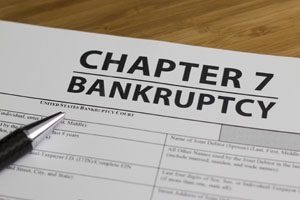A Summary of the Chapter Options
 Each Chapter of bankruptcy is designed for certain kinds of debtors, and certain kinds of circumstances.
Each Chapter of bankruptcy is designed for certain kinds of debtors, and certain kinds of circumstances.
For consumers and small business owners, usually either Chapter 7“straight bankruptcy” or Chapter 13“adjustment of debts”is appropriate, or occasionally Chapter 11“reorganization.”
This blog post briefly describes all the bankruptcy Chapters, and then goes into some more detail on consumer Chapter 7 and 13:
-
Chapter 7: by far the most commonly filed Chapter. It discharges (legally and permanently writes off) most debts. It usually gives you options for dealing with secured debts (those with collateral). Can be filed by individuals, married couples, corporations, partnerships and other business entities. Consumer cases are usually completed in about three months.
-
Chapter 9: a restructuring of debts of a city, county, or other subdivision of a state. Very few are filed—usuallyless than 20 cases per year in the entire country.
-
Chapter 11: a “reorganization” of debts. Usually used by corporations and other business entities. But can be filed by individuals, usually when their debts exceed the debt limits for filing Chapter 13.
-
Chapter 12: a specialized type of bankruptcy designed for family farmers, ranchers, dairy owners, poultry and livestock producers, as well as family fishermen. It helps save the debtor’s farm and business by reducing and restructuring debt.
-
Chapter 13: the 3-to-5-year consumer payment plan, formally called “adjustment of debts of an individual with regular income.”Can also be filed by a married couple. Has many advantages not provided by Chapter 7, especially in dealing with secure debts and unusual debts such as taxes and divorce obligations.
Chapter 7
Consumer Chapter 7 cases are filed by individuals and couples, often with legally less complicated situations:
-
Abankruptcy trustee reviews the debtors’assets—based mostly on paperwork submitted by their attorney and by asking questions at a meeting. The trustee then determines whether everything the debtor owns is protected by property exemptions. If not, the trusteemay take any non-exempt assets, sell them, and uses the money to pay a portion of the debts. HOWEVER, most of the time all the assets that debtors own ARE covered by the available property exemptions, so the trustee takes nothing.
-
Chapter 7 debtors usually have the option of either keeping and paying for any collateral on their debts, or surrendering the collateral and owing nothing.
-
Certain special debts are not legally dischargedunder Chapter 7—such as most student loans, all child and spousal support, and recent income taxes. Other creditors can challenge the discharge of their debts, but only under very specific circumstances of fraud or other bad behavior by the debtor. Most of the time, all debts that the debtor wants to discharge ARE discharged.
Chapter 13
In contrast, Chapter 13 cases tend to be filed by debtors facing less straightforward situations:
-
Chapter 13 provides ways to protect assets that a Chapter 7 trustee could otherwise take.
-
Provides much greater flexibility forkeeping collateral—home, vehicle, furniture, etc.
-
Provides much more legal power to deal with otherwise powerful creditors, such as the IRS, child support enforcement agencies, and student loan creditors.
-
Chapter 13 gives a way to protect co-signers.
-
The debtor’s attorney works with the debtor to put together a “Chapter 13 payment plan, a formal arrangement for paying a portion (or rarely, all of) the debts. The plan goes through a bankruptcy court approval process, with possible objection and input by the Chapter 13 trustee and by the creditors. Once the Court approves the Plan—either as the debtor originally proposed it or with changes—the trustee begins distributing the money to the creditors according the terms of the plan.
If you are in the Dallas-Fort WorthMetroplex, I can help you understand these Chapter options. I’m Carrie Weir, an experienced Texas bankruptcy lawyer. I work with individuals, couples, and small businesses mostly in and near the towns of Rockwall, Heath, Greenville, Lavon, Wylie, Mesquite, Royse City, Sachse, and Rowlett. Please call me for a free and confidential consultation at 972-772-3083, or use the contact form here.
Thanks for checking out my website.








Speak Your Mind